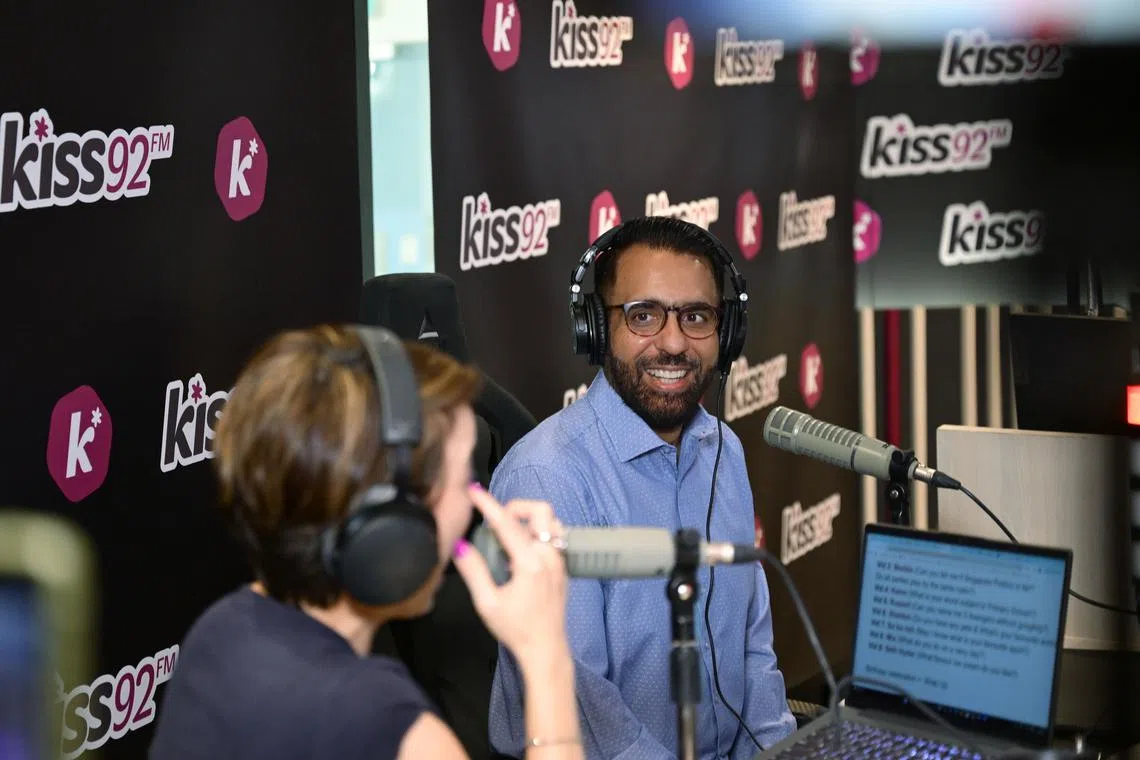Pritam Singh had hoped WP would ‘tip one or two more constituencies’ at GE2025
Sign up now: Get ST's newsletters delivered to your inbox

WP chief Pritam Singh on The Big Show on Kiss92 FM on Aug 4.
ST PHOTO: NG SOR LUAN
- The Workers' Party aimed to gain one or two more constituencies in the recent General Election but fell short of this goal.
- Pritam Singh said boundary changes shifted the party's strategy, necessitating a "pivot".
- Singh praised his party's candidates and highlighted the importance of hard work for opposition candidates due to limited resources.
AI generated
SINGAPORE – The Workers’ Party was hoping to win one or two new constituencies at the May general election, and had come close, though it was not enough to succeed, said party chief Pritam Singh on Aug 4.
“It was a difficult election for us. As a small political party, obviously, elections are going to be difficult, but we did our best,” he said, speaking on The Big Show on Kiss92 FM.
The WP fielded 26 candidates, including 14 new faces
In the end, the party won 10 seats to entrench its incumbent positions
Asked by DJs Glenn Ong and Angelique Teo about the electoral showing, Mr Singh said that he had hoped the party would “tip one or two more constituencies”.
“(We) came close, not close enough. But that just tells you there’s still work to do. So we go at it again,” he added, speaking in what he said was his first radio interview.
The WP had drawn flak from other opposition parties for not contesting Marine Parade-Braddell Heights GRC
Mr Singh, who is Leader of the Opposition, said on the radio show that the party had decided to change its strategy after studying the boundary changes by the Electoral Boundaries Review Committee.
WP had contested in Marine Parade GRC in the 2015 and 2020 general elections, getting 35.93 per cent and 42.26 per cent of the vote share respectively.
In the most recent election, the constituency had absorbed MacPherson SMC and an adjacent polling district from Mountbatten SMC
Asked about how boundary changes impacted his party’s strategy, Mr Singh said: “Before the elections, you have the boundary review committee which always sort of resets the playing board, and of course when the playing board is reset, you’ve got to reset your strategy.”
He added that the party was looking at the electoral map not just for one election, but for the future as well, and decided it had to “pivot”.
“Ultimately, you’ve got only that many cards in your hands, only that many candidates who are prepared to fly the flag, and we decided that the strategy for the party was important.
“But we still hang around a lot in the Marine Parade area. Generally we are more familiar with the eastern part of Singapore.”
Mr Singh also spoke about his party’s candidates at the recent general election, saying that he thought they did incredibly well, though he did not name names.
He said that he was encouraged by the number of people who were prepared to step up to volunteer with the party and to contest the election under its banner.
“The value proposition we’re providing you is a very difficult journey. It speaks of these candidates who have chosen to enter the ring... It speaks a lot for themselves and their character.”
He added that an important trait for opposition candidates is someone who is prepared to work hard, “because you don’t really have much wind behind you to push you forward, you’ve got to create that wind through your own energy and own effort”.
Mr Singh also touched on topics ranging from his favourite sport to his favourite band, and what his childhood was like.
He likes football, though he does not play frequently any more and often regrets it after a kick-around because of the muscle aches; he likes Irish rock band U2, and had a carefree childhood where his parents allowed him to do what he wanted.
He also took pre-recorded questions from eight young Singaporeans ranging from four to 11 years of age.
One of them asked him if politics in Singapore is fair, and if all parties play by the same rules.
To this, Mr Singh said: “I think we should always endeavour to develop and nourish a system where the rules are the same for everyone.
“I’d like to think that that’s the road we’re on, and we should remain on that road.”



